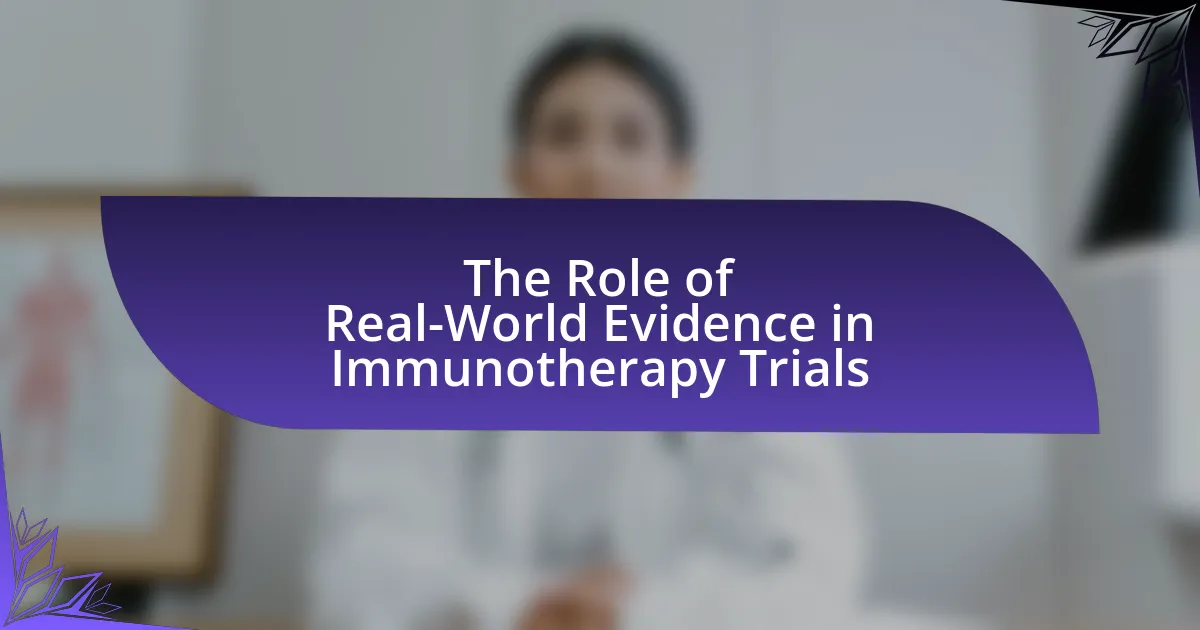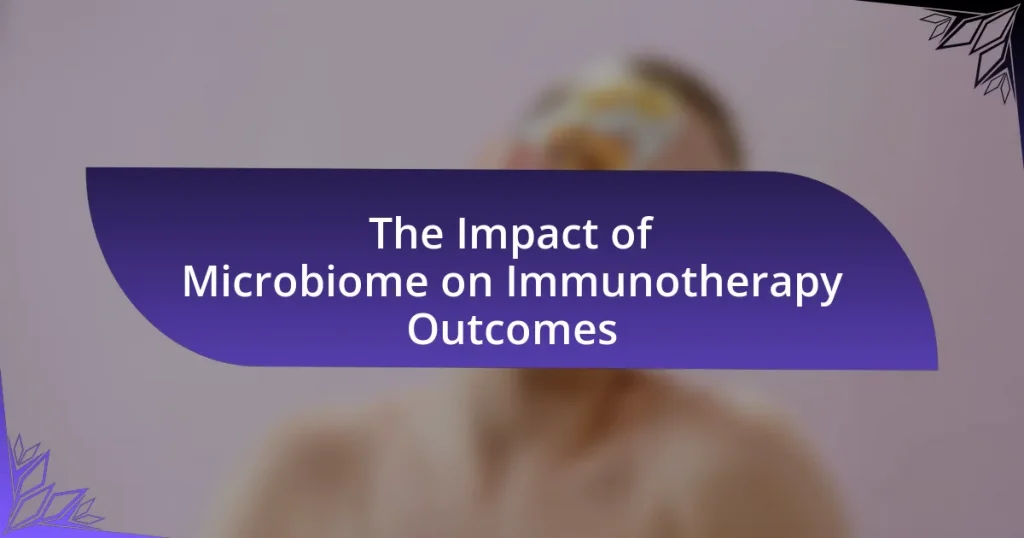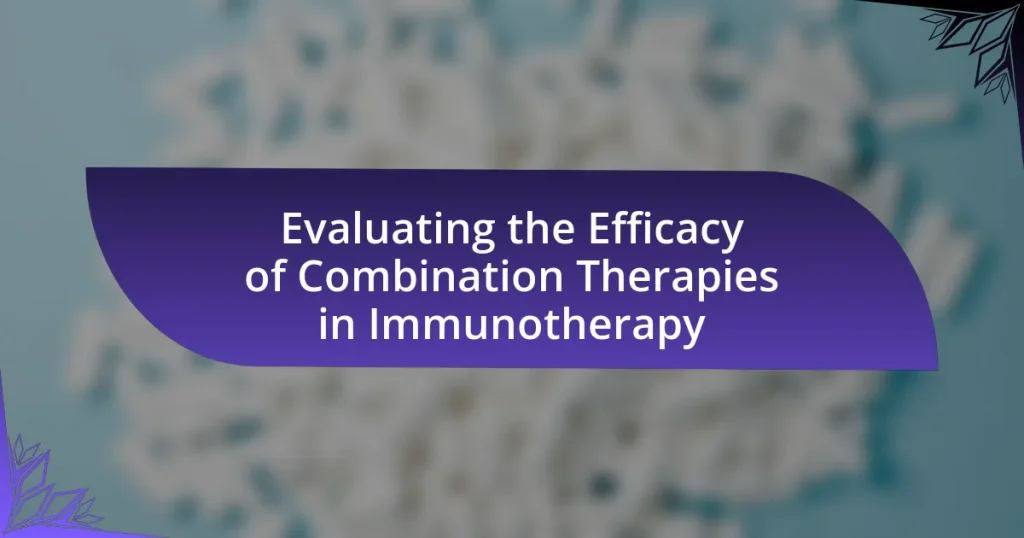Real-world evidence (RWE) is increasingly recognized for its critical role in immunotherapy trials, providing insights into treatment effectiveness and safety across diverse patient populations outside controlled clinical settings. This article explores the definition of RWE, the types of data it encompasses, and its importance in complementing traditional clinical trial findings. It discusses the challenges associated with integrating RWE into immunotherapy research, including data variability and regulatory acceptance, while highlighting its potential to inform regulatory decisions and post-marketing surveillance. Additionally, the article outlines best practices for collecting and analyzing RWE, emphasizing the need for collaboration among stakeholders and addressing ethical considerations in its application.
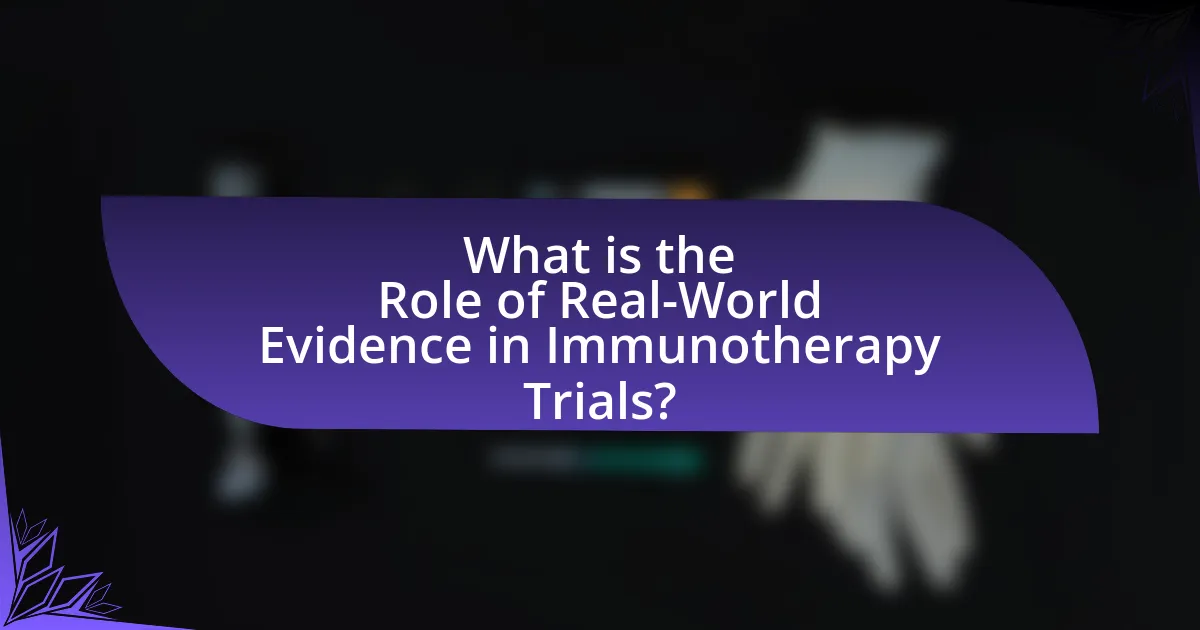
What is the Role of Real-World Evidence in Immunotherapy Trials?
Real-world evidence (RWE) plays a crucial role in immunotherapy trials by providing insights into treatment effectiveness and safety in diverse patient populations outside of controlled clinical settings. RWE helps to validate clinical trial findings, assess long-term outcomes, and identify potential adverse effects that may not be evident in traditional trials. For instance, studies have shown that RWE can reveal variations in treatment responses based on demographic factors, comorbidities, and real-life adherence to therapy, thereby enhancing the understanding of immunotherapy’s impact in broader patient groups.
How is Real-World Evidence defined in the context of immunotherapy?
Real-World Evidence (RWE) in the context of immunotherapy is defined as data derived from real-world settings, such as clinical practice, patient registries, and electronic health records, rather than controlled clinical trials. This type of evidence provides insights into the effectiveness, safety, and utilization of immunotherapy treatments in diverse patient populations, reflecting actual treatment outcomes and experiences. RWE is increasingly recognized for its ability to complement traditional clinical trial data, as it captures a broader range of patient demographics and comorbidities, thereby enhancing the understanding of immunotherapy’s impact in everyday clinical settings.
What types of data are considered real-world evidence?
Real-world evidence encompasses various types of data derived from real-world settings rather than controlled clinical trials. This includes electronic health records, insurance claims data, patient registries, and data from wearable devices. These data sources provide insights into treatment effectiveness, safety, and patient outcomes in everyday clinical practice, supporting the understanding of immunotherapy’s impact in diverse populations.
How does real-world evidence differ from traditional clinical trial data?
Real-world evidence differs from traditional clinical trial data primarily in its source and context. Traditional clinical trials are conducted in controlled environments with strict protocols, focusing on specific populations and endpoints, which can limit generalizability. In contrast, real-world evidence is derived from data collected outside of these controlled settings, such as electronic health records, insurance claims, and patient registries, reflecting a broader patient population and diverse treatment scenarios. This difference allows real-world evidence to capture the effectiveness and safety of interventions in everyday clinical practice, providing insights that may not be evident in traditional trials. For instance, a study published in the Journal of Clinical Oncology demonstrated that real-world data can reveal variations in treatment outcomes among different demographic groups, highlighting the importance of considering real-world evidence in understanding the full impact of therapies.
Why is Real-World Evidence important for immunotherapy trials?
Real-World Evidence (RWE) is important for immunotherapy trials because it provides insights into treatment effectiveness and safety in diverse patient populations outside controlled clinical settings. RWE captures data from everyday clinical practice, which helps to understand how immunotherapies perform in real-life scenarios, including variations in patient demographics, comorbidities, and treatment adherence. Studies have shown that RWE can complement clinical trial data by revealing long-term outcomes and rare adverse events that may not be fully captured in traditional trials. For instance, a study published in the Journal of Clinical Oncology demonstrated that RWE can identify differences in treatment responses among various ethnic groups, highlighting the need for tailored immunotherapy approaches.
What insights can real-world evidence provide about patient populations?
Real-world evidence provides insights into the demographics, treatment patterns, and outcomes of patient populations in immunotherapy trials. This evidence reflects the actual experiences of patients outside controlled clinical settings, revealing how various factors such as age, comorbidities, and socioeconomic status influence treatment effectiveness and safety. For instance, studies have shown that real-world data can highlight disparities in access to immunotherapy among different racial and ethnic groups, thereby informing strategies to improve equity in treatment. Additionally, real-world evidence can identify long-term outcomes and adverse effects that may not be captured in traditional clinical trials, enhancing understanding of the overall impact of immunotherapy on diverse patient populations.
How does real-world evidence contribute to understanding treatment effectiveness?
Real-world evidence contributes to understanding treatment effectiveness by providing insights into how therapies perform in everyday clinical settings, beyond controlled trial conditions. This type of evidence captures data from diverse patient populations, treatment regimens, and varying healthcare environments, which enhances the generalizability of findings. For instance, studies have shown that real-world data can reveal differences in treatment outcomes based on demographic factors, comorbidities, and adherence levels, which are often not fully represented in randomized controlled trials. By analyzing this data, researchers can identify patterns and factors that influence treatment success, thereby informing clinical decision-making and optimizing therapeutic strategies.
What challenges are associated with integrating Real-World Evidence into immunotherapy trials?
Integrating Real-World Evidence (RWE) into immunotherapy trials presents several challenges, including data variability, regulatory acceptance, and methodological rigor. Data variability arises from differences in patient populations, treatment settings, and outcomes measured in real-world settings compared to controlled trial environments. Regulatory acceptance is often hindered by a lack of standardized guidelines for RWE, making it difficult for regulatory bodies to evaluate its validity and relevance. Methodological rigor is challenged by the need for robust statistical techniques to account for confounding factors and biases inherent in observational data. These challenges can impede the effective incorporation of RWE into the design and analysis of immunotherapy trials, ultimately affecting the reliability of findings and their applicability to broader patient populations.
What are the limitations of real-world evidence in clinical research?
Real-world evidence in clinical research has several limitations, including potential biases, lack of control over variables, and issues with data quality. These limitations arise because real-world data often comes from diverse sources, such as electronic health records and insurance claims, which may not be standardized or systematically collected. For instance, observational studies can introduce selection bias, as patients included may not represent the broader population. Additionally, confounding factors that are not controlled for can skew results, making it difficult to establish causality. Furthermore, data completeness and accuracy can vary significantly, impacting the reliability of findings. These factors collectively hinder the ability to draw definitive conclusions from real-world evidence in clinical research.
How can biases in real-world data affect trial outcomes?
Biases in real-world data can significantly skew trial outcomes by misrepresenting the effectiveness and safety of treatments. For instance, if a trial predominantly includes data from a specific demographic, it may not accurately reflect the treatment’s performance across diverse populations, leading to misleading conclusions about its generalizability. A study published in the Journal of Clinical Oncology found that biases in patient selection and reporting can result in overestimated treatment benefits, as seen in trials where participants were not representative of the broader patient population. This misrepresentation can ultimately affect clinical decision-making and patient care, as healthcare providers may rely on flawed data to guide treatment options.
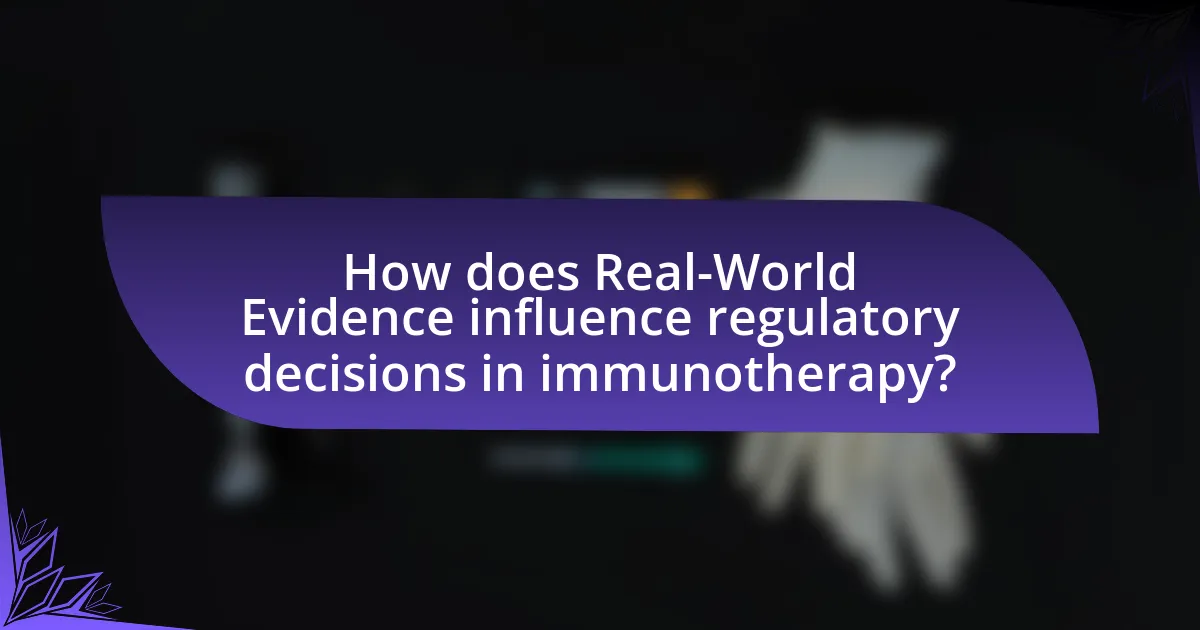
How does Real-World Evidence influence regulatory decisions in immunotherapy?
Real-World Evidence (RWE) significantly influences regulatory decisions in immunotherapy by providing data on treatment effectiveness and safety in diverse patient populations outside of controlled clinical trials. Regulatory agencies, such as the FDA and EMA, utilize RWE to supplement clinical trial data, enabling them to assess the real-world impact of immunotherapies on various demographics, including those with comorbidities or varying genetic backgrounds. For instance, the FDA has approved several immunotherapies based on RWE that demonstrated improved outcomes in broader patient populations, thereby enhancing the understanding of treatment benefits and risks in everyday clinical settings. This integration of RWE into regulatory frameworks supports more informed decision-making and can expedite the approval process for innovative therapies.
What role does real-world evidence play in the approval process for immunotherapy treatments?
Real-world evidence plays a critical role in the approval process for immunotherapy treatments by providing data on the effectiveness and safety of these therapies in diverse patient populations outside of controlled clinical trials. Regulatory agencies, such as the FDA, increasingly consider real-world evidence to supplement traditional clinical trial data, as it reflects how treatments perform in everyday clinical settings. For instance, studies have shown that real-world evidence can identify patient subgroups that may benefit from immunotherapy, leading to more personalized treatment approaches. Additionally, real-world data can help monitor long-term outcomes and adverse effects, enhancing the overall understanding of a therapy’s impact post-approval.
How have regulatory agencies utilized real-world evidence in recent approvals?
Regulatory agencies have increasingly utilized real-world evidence (RWE) in recent approvals to support the efficacy and safety of immunotherapies. For instance, the U.S. Food and Drug Administration (FDA) has incorporated RWE from electronic health records and patient registries to evaluate treatment outcomes in diverse populations, which enhances the understanding of drug performance outside controlled clinical trials. A notable example is the FDA’s approval of the CAR T-cell therapy, where RWE demonstrated its effectiveness in real-world settings, confirming clinical trial results and addressing variability in patient responses. This approach allows regulatory bodies to make informed decisions based on comprehensive data reflecting actual patient experiences, thereby expediting access to innovative therapies.
What guidelines exist for the use of real-world evidence in regulatory submissions?
The guidelines for the use of real-world evidence (RWE) in regulatory submissions are primarily outlined by the U.S. Food and Drug Administration (FDA) and the European Medicines Agency (EMA). The FDA’s framework emphasizes the importance of RWE in supporting regulatory decisions, particularly in post-market settings, as detailed in their 2018 guidance document titled “Real-World Evidence Program.” This document specifies that RWE can be used to support the approval of new indications, label expansions, and post-market safety studies. Similarly, the EMA has issued guidelines that recognize RWE’s role in assessing the effectiveness and safety of medicinal products, particularly in the context of orphan drugs and rare diseases. These guidelines encourage the integration of RWE into clinical development plans and highlight the need for robust methodologies to ensure the reliability of the evidence presented.
How can real-world evidence support post-marketing surveillance of immunotherapies?
Real-world evidence can support post-marketing surveillance of immunotherapies by providing insights into the long-term safety and effectiveness of these treatments in diverse patient populations. This evidence is derived from data collected outside of controlled clinical trials, such as electronic health records, insurance claims, and patient registries. For instance, studies have shown that real-world data can identify rare adverse events and variations in treatment responses that may not be evident in clinical trials, which typically involve more homogeneous patient groups. A notable example is the use of real-world evidence in monitoring the safety of checkpoint inhibitors, where data from large patient cohorts revealed immune-related adverse events that were not fully characterized during pre-approval studies. This ongoing surveillance is crucial for informing clinical practice and regulatory decisions, ensuring that immunotherapies are used safely and effectively in the broader population.
What are the benefits of monitoring long-term outcomes using real-world evidence?
Monitoring long-term outcomes using real-world evidence provides critical insights into the effectiveness and safety of treatments in diverse patient populations. This approach allows for the assessment of treatment impacts beyond controlled clinical trial settings, capturing data on patient experiences, adherence, and long-term health outcomes. For instance, studies have shown that real-world evidence can reveal variations in treatment responses among different demographic groups, which is essential for personalized medicine. Additionally, real-world data can help identify rare adverse events that may not be evident in clinical trials, thereby enhancing patient safety. Overall, leveraging real-world evidence in monitoring long-term outcomes supports informed decision-making and improves healthcare quality.
How does real-world evidence help in identifying rare adverse events?
Real-world evidence aids in identifying rare adverse events by providing data from diverse patient populations outside controlled clinical trials. This evidence encompasses information from electronic health records, insurance claims, and patient registries, which collectively capture a broader spectrum of patient experiences and outcomes. For instance, studies have shown that real-world data can reveal adverse events that occur infrequently in clinical trials due to limited sample sizes, thereby enhancing the understanding of drug safety profiles. A notable example is the identification of rare cardiovascular events associated with certain immunotherapies, which were documented through post-marketing surveillance and patient-reported outcomes, highlighting the importance of real-world evidence in monitoring long-term safety.
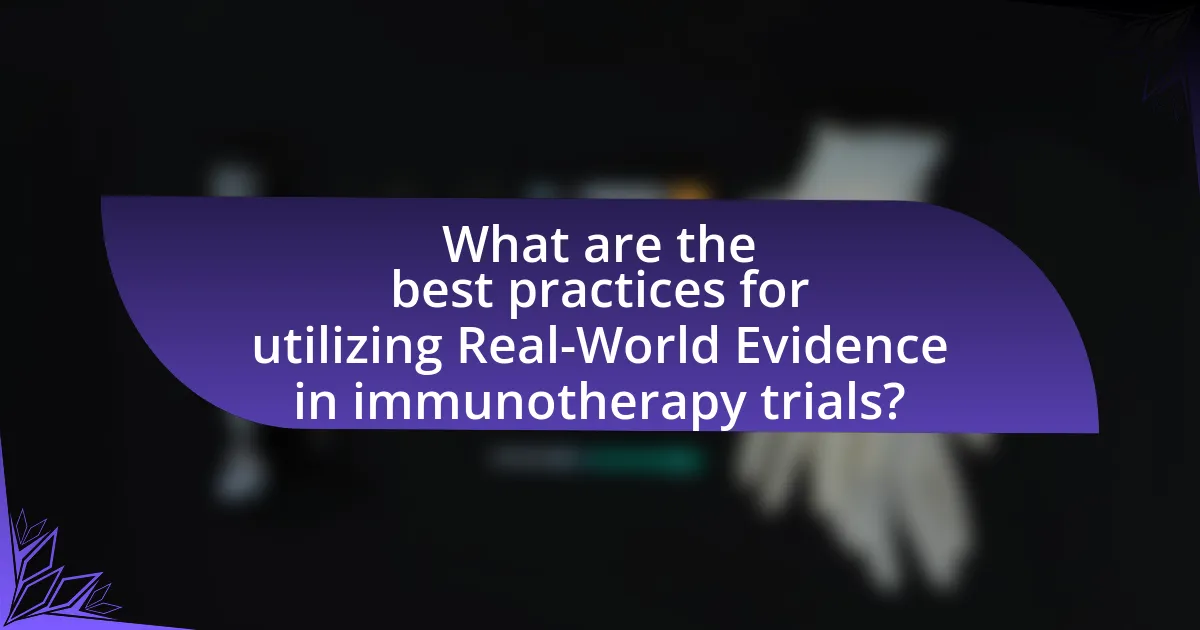
What are the best practices for utilizing Real-World Evidence in immunotherapy trials?
The best practices for utilizing Real-World Evidence (RWE) in immunotherapy trials include defining clear objectives, ensuring robust data collection methods, and engaging stakeholders throughout the process. Clear objectives help in identifying specific questions that RWE can address, such as treatment effectiveness in diverse populations. Robust data collection methods, including electronic health records and patient registries, enhance the quality and reliability of the evidence gathered. Engaging stakeholders, including patients, clinicians, and regulatory bodies, ensures that the RWE is relevant and meets the needs of all parties involved. These practices are supported by studies indicating that well-structured RWE can complement clinical trial data, providing insights into real-world treatment outcomes and patient experiences.
How can researchers effectively collect real-world evidence?
Researchers can effectively collect real-world evidence by utilizing diverse data sources such as electronic health records, patient registries, and insurance claims. These sources provide comprehensive insights into patient outcomes, treatment patterns, and healthcare utilization in real-world settings. For instance, a study published in the Journal of Clinical Oncology demonstrated that data from electronic health records can reveal treatment effectiveness and safety in a broader patient population compared to controlled clinical trials. By integrating these data sources, researchers can enhance the robustness of their findings and ensure that the evidence reflects actual clinical practice.
What methodologies are recommended for gathering real-world data?
Recommended methodologies for gathering real-world data include observational studies, patient registries, and electronic health records (EHRs). Observational studies allow researchers to collect data on patients in their natural settings without intervention, providing insights into treatment effectiveness and safety. Patient registries systematically collect data on patients with specific conditions, facilitating long-term follow-up and outcomes assessment. EHRs offer a comprehensive source of patient data, including demographics, treatment history, and clinical outcomes, enabling large-scale analysis of real-world evidence. These methodologies are validated by their widespread use in clinical research, demonstrating their effectiveness in capturing diverse patient experiences and outcomes in immunotherapy trials.
How can technology enhance the collection of real-world evidence?
Technology can enhance the collection of real-world evidence by utilizing digital health tools, data analytics, and remote monitoring systems. Digital health tools, such as mobile applications and wearable devices, facilitate the continuous collection of patient data outside clinical settings, capturing real-time health metrics and patient-reported outcomes. Data analytics enables the processing of large datasets to identify trends and correlations that inform treatment effectiveness and safety. Remote monitoring systems allow healthcare providers to track patient adherence and response to therapies in real-world settings, thereby improving the quality and relevance of the evidence collected. For instance, a study published in the Journal of Medical Internet Research demonstrated that mobile health interventions significantly improved patient engagement and data accuracy in chronic disease management, underscoring the potential of technology in enhancing real-world evidence collection.
What strategies can be employed to analyze real-world evidence in immunotherapy trials?
To analyze real-world evidence in immunotherapy trials, researchers can employ strategies such as observational studies, patient registries, and real-world data analytics. Observational studies allow for the collection of data from patients receiving immunotherapy in routine clinical practice, providing insights into treatment effectiveness and safety outside controlled trial settings. Patient registries systematically gather data on patient outcomes, demographics, and treatment patterns, facilitating long-term follow-up and comparative effectiveness research. Real-world data analytics utilizes large datasets from electronic health records and claims data to identify trends, treatment responses, and adverse events, enhancing the understanding of immunotherapy’s impact in diverse populations. These strategies collectively support the evaluation of immunotherapy in real-world settings, contributing to evidence-based clinical decision-making.
What statistical methods are most effective for real-world data analysis?
The most effective statistical methods for real-world data analysis include regression analysis, propensity score matching, and survival analysis. Regression analysis allows researchers to understand relationships between variables and predict outcomes, which is crucial in evaluating treatment effects in immunotherapy trials. Propensity score matching helps control for confounding variables by matching treated and untreated subjects with similar characteristics, thereby improving the validity of causal inferences. Survival analysis is essential for analyzing time-to-event data, particularly in clinical settings where the timing of outcomes is critical. These methods are widely used in studies assessing the effectiveness and safety of immunotherapies, as evidenced by their application in numerous clinical research publications, such as the study by Hwang et al. (2020) in the Journal of Clinical Oncology, which utilized these techniques to analyze real-world outcomes in cancer patients receiving immunotherapy.
How can researchers ensure the validity of their findings from real-world evidence?
Researchers can ensure the validity of their findings from real-world evidence by employing rigorous study designs, such as randomized controlled trials (RCTs) or well-defined observational studies. These methodologies help minimize biases and confounding factors that can distort results. For instance, using propensity score matching can balance characteristics between treatment groups, thereby enhancing the comparability of outcomes. Additionally, researchers should utilize large, diverse datasets to capture a wide range of patient experiences and treatment responses, which strengthens the generalizability of the findings. Validity can also be reinforced through sensitivity analyses, which assess how results change under different assumptions or conditions, ensuring robustness. Furthermore, peer review and replication of studies by independent researchers serve as critical checks on the validity of the findings, as demonstrated in various immunotherapy trials where real-world evidence has been cross-validated with clinical trial data.
What are the key considerations for stakeholders when implementing real-world evidence in immunotherapy trials?
Key considerations for stakeholders when implementing real-world evidence in immunotherapy trials include data quality, regulatory compliance, and stakeholder engagement. Data quality is crucial as it ensures that the evidence collected is reliable and representative of the patient population; studies have shown that high-quality data can significantly impact treatment outcomes and decision-making. Regulatory compliance is essential to align with guidelines set by authorities such as the FDA, which emphasizes the need for robust methodologies in collecting and analyzing real-world data. Stakeholder engagement, including collaboration with healthcare providers and patients, is vital to ensure that the evidence reflects real-world experiences and addresses the needs of the target population, thereby enhancing the relevance and applicability of trial findings.
How can collaboration between stakeholders enhance the use of real-world evidence?
Collaboration between stakeholders enhances the use of real-world evidence by facilitating data sharing, improving study design, and increasing the relevance of findings. When stakeholders such as healthcare providers, researchers, and pharmaceutical companies work together, they can pool diverse data sources, leading to a more comprehensive understanding of treatment outcomes. For instance, a study published in the Journal of Clinical Oncology demonstrated that multi-stakeholder collaborations resulted in more robust datasets, which improved the validity of real-world evidence in assessing immunotherapy effectiveness. This collaborative approach not only enriches the evidence base but also ensures that the insights gained are applicable to a broader patient population, ultimately informing better clinical decisions and policy-making.
What ethical considerations must be addressed when using real-world evidence?
When using real-world evidence, ethical considerations include patient consent, data privacy, and the potential for bias. Patient consent is crucial as individuals must be informed about how their data will be used, ensuring transparency and respect for autonomy. Data privacy is essential to protect sensitive information, as breaches can lead to harm and loss of trust. Additionally, the potential for bias in data collection and interpretation can affect the validity of findings, necessitating rigorous methodologies to ensure that evidence is representative and reliable. These considerations are vital to uphold ethical standards in research and maintain public confidence in the use of real-world evidence in immunotherapy trials.
